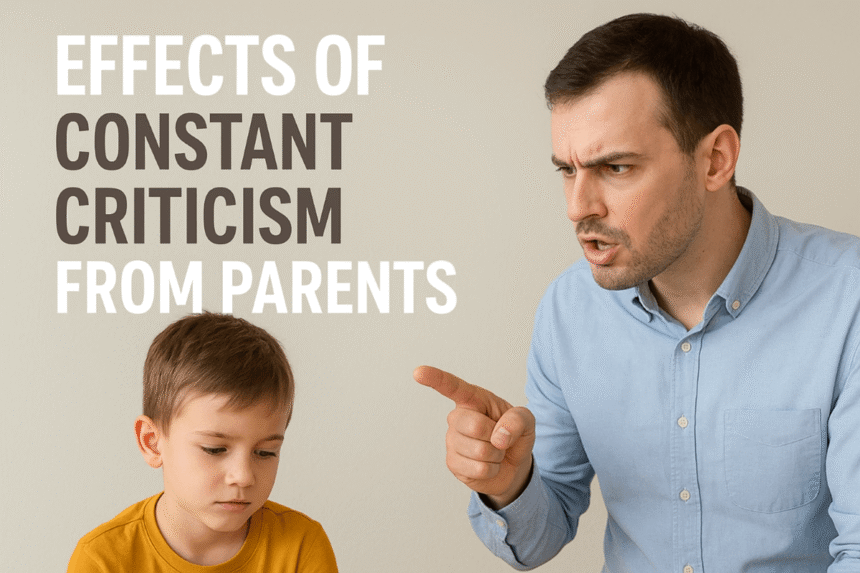Effects of constant criticism from parents can have a lasting impact on a child’s self-esteem, confidence, and emotional development. While correcting mistakes is necessary, frequent harsh words can leave deep emotional scars, shaping how children see themselves and the world. By approaching errors with patience, understanding, and love, parents can help their children learn, grow, and develop resilience. This blog explores why criticism can be harmful and how to replace it with constructive guidance and positive reinforcement.
Effects of Constant Criticism from Parents
Constant criticism from parents can leave deep emotional scars that affect self-esteem, confidence, relationships, and overall development. While correcting mistakes is necessary, how parents communicate correction makes all the difference. Replacing criticism with empathy, understanding, and constructive guidance fosters resilience, self-belief, and emotional well-being. Parents who model patience, provide positive reinforcement, and correct behaviour with love create an environment where children feel safe to grow, learn, and explore their potential. Children may forget what was said, but they will always remember how they felt—and nurturing them with love leaves a lasting, positive impact.
Parents often think that pointing out mistakes helps children improve. But frequent criticism can lower self-esteem, create fear of failure, and harm parent-child relationships. Children may forget the mistake, but they remember the criticism. Here are the effects of constant criticism.
1. Low Self-Esteem and Lack of Confidence
Children who experience constant criticism often internalise the negative messages they receive, believing them to be true reflections of their worth. For example, a child who repeatedly hears comments like, “You never do anything right” or “You’re always messing up” may start to see themselves as inherently incapable or inadequate. Over time, this erodes self-esteem and diminishes confidence, making them hesitant to try new activities or take on challenges. Even small setbacks, like scoring lower than expected on a test or forgetting to complete a chore, may trigger feelings of failure and hopelessness. The result is a child who constantly doubts their abilities, even when they are competent.
2. Fear of Trying New Things
One of the most damaging effects of constant criticism is that it instils a fear of failure. Children learn to avoid risks and new experiences because they associate mistakes with harsh judgment. For instance, a child scolded for spilling milk while helping in the kitchen may decide to stop helping altogether, fearing further criticism. Similarly, a student mocked for performing poorly in a school presentation may avoid participating in class discussions, extracurricular activities, or competitions in the future. Over time, this fear can extend into adolescence and adulthood, limiting personal growth, creativity, and opportunities for achievement. Children learn to prioritise safety and approval over exploration and self-expression.
3. Emotional Distress and Anxiety
Frequent criticism often leads to chronic stress and anxiety. A child who constantly hears negative comments like, “Why can’t you do anything right?” may develop a heightened sense of self-consciousness and worry excessively about their actions. For example, a teenager criticised for asking questions in class may become reluctant to speak up, even when they have valuable ideas. This pattern of anxiety can affect relationships with peers, academic performance, and overall emotional well-being. Long-term exposure to criticism can also increase the risk of depression, social withdrawal, and emotional instability, leaving children unprepared to cope with challenges later in life.
4. Strained Parent-Child Relationships
Children who face constant criticism may gradually distance themselves emotionally from their parents. For example, if a child is repeatedly criticised for their choice of friends, hobbies, or personal interests, they may stop sharing experiences, achievements, or challenges with their parents to avoid further judgment. Over time, this creates an emotional gap, reducing trust and open communication. Parents may feel frustrated when children do not seek guidance, while children feel misunderstood, undervalued, or unsupported. Maintaining a warm, empathetic approach and focusing on constructive guidance rather than negative commentary helps preserve a strong, trusting parent-child bond.

5. Negative Impact on Social and Work Life
The effects of constant criticism often extend well into adolescence and adulthood. Adults who were frequently criticised as children may struggle with self-confidence in social interactions, fear failure, or avoid leadership opportunities at work. For instance, someone who was repeatedly told, “You’re not good at math,” may avoid career paths involving problem-solving, analytics, or decision-making, despite having potential skills. Similarly, a young adult who was criticised for speaking up as a child may find it difficult to express opinions, negotiate, or assert themselves in personal and professional relationships. The internalised negative messages can influence career choices, social life, and even overall life satisfaction.
6. Encouraging Positive Change
Parents can counteract the harmful effects of constant criticism by replacing harsh words with empathy, understanding, and constructive guidance. For example, if a child forgets to complete homework, instead of saying, “You never remember anything,” a parent can say, “I know you forgot this time. Let’s figure out a way to remember next time.” Positive reinforcement, modelling patience, and correcting behaviour without attacking character encourage children to learn from mistakes without fear. Praising effort, highlighting strengths, and acknowledging small improvements build confidence and resilience. Over time, children learn that mistakes are opportunities for growth rather than reasons for shame or punishment.

Effects of Constant Critisism from Parents – Steps to Guide Children
1. Understand Before You Speak
Before addressing a child’s mistake, take time to understand their perspective. Children often act out of curiosity, confusion, or emotion, not malice. For example, if your child spills juice on the floor, instead of saying, “You’re careless,” try, “I see the juice spilt—let’s clean it up together.” This approach encourages reflection, teaches responsibility, and avoids fear or shame. Avoiding constant criticism from parents helps children feel safe and supported while learning from mistakes.
2. Discipline vs. Criticism: Knowing the Difference
Discipline focuses on behaviour and guides children toward better choices. Criticism attacks the child’s character. For example, saying, “You never do anything right” is criticism. Saying, “Next time, let’s try a different approach” is discipline. Discipline builds confidence and responsibility. Criticism, especially when constant, damages self-esteem and can make children afraid to try new things. Parents who avoid constant criticism from parents create a safe space for learning.
3. The Lasting Impact of Constant Criticism from Parents
Children internalise repeated negative comments. Constant criticism from parents may make children feel they are not good enough. For example, a child criticised for small mistakes in school may start believing they are incapable. Over time, this affects confidence, relationships, and willingness to take risks. Even into adulthood, children who experience constant criticism may struggle with self-esteem and social interactions.
4. Correct with Love, Not Harsh Words
When a child makes a mistake, focus on the action, not the child. Say, “That choice wasn’t ideal, but I know you can improve,” instead of labelling them “bad” or “careless.” This approach shows accountability while expressing belief in their potential. Avoiding constant criticism from parents while correcting behaviour fosters trust and learning. Children learn that mistakes are opportunities for improvement, not reasons for shame.

Raising Curious Children: How Inspiration Shapes Smart and Creative Kids
5. Avoid Public Humiliation
Criticising children in front of others can cause embarrassment and shame. Always correct privately. For example, if a child misbehaves at a family event, calmly say, “We’ll discuss this later,” instead of scolding publicly. Private correction prevents emotional harm and avoids creating a pattern of constant criticism from parents. Children retain dignity while learning the right behaviour.
6. Use Words That Build Confidence
Positive reinforcement strengthens resilience and self-belief. Encourage children with statements like, “I’m proud of your effort,” or “You can do this.” For example, if a child struggles with homework, instead of saying, “You didn’t try hard enough,” say, “Let’s figure out a better way together.” Replacing constant criticism from parents with supportive language helps children associate mistakes with learning rather than fear.
Raising Respectful Sons | How to Raise Sons Who Respect Women (and Everyone Else)
Conclusion
Parenting is not about perfection—it’s about connection. Effects of Constant criticism from parents may control a child’s behaviour in the short term, but it erodes their confidence in the long run. Replace harsh words with patient guidance, and criticism with compassion. Correct with love, listen with empathy, and guide with wisdom. Remember: children might forget what you said, but they will always remember how you made them feel.
Building Emotional Resilience in Children: Why Letting Kids Cry Builds Strength
5 FAQs – Effects of Constant Criticism from Parents
1. What is constant criticism from parents?
Constant criticism from parents means repeatedly pointing out a child’s flaws or mistakes without offering constructive guidance or emotional support. It often focuses on what the child did wrong rather than how they can improve.
2. How does constant criticism affect children?
It damages self-esteem, increases fear of failure, and makes children doubt their worth. Over time, they may grow into adults who seek approval or avoid challenges due to fear of being judged.
3. How can parents correct children without criticism?
Focus on behaviour, not personality. Use calm, specific language like “Let’s work on this together,” and express faith in their ability to improve. Replace “You always” statements with “Next time, try this.”
4. Is discipline better than criticism?
Yes. Discipline teaches responsibility and helps children understand consequences in a positive, structured way. Criticism, however, often attacks character and leaves emotional wounds.
5. What can parents do if they’ve already been too critical?
It’s never too late to change. Apologise sincerely, acknowledge your mistake, and make an effort to communicate with empathy going forward. Children are forgiving when they see genuine love and effort.
Thank you for taking the time to explore this post. I hope you found it both insightful and enjoyable.
Remember, your sharing can make a positive impact! Please share this post across your social media and other networks, allowing others to benefit from its content.
PVM

Mathukutty P. V. is the founder of Simply Life Tips, a blogger, content writer, influencer, and YouTuber passionate about learning and sharing. Guided by “Simple Living, Creative Thinking,” he believes in the power of knowledge sharing and lifelong learning.
Related
Discover more from Simply Life Tips
Subscribe to get the latest posts sent to your email.







